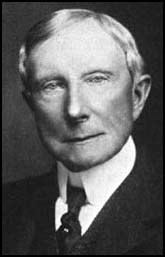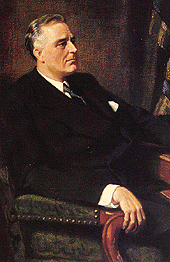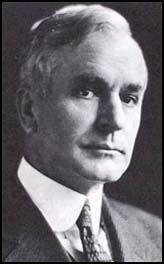Thomas Woods and His Critics:
A Review Essay

III
After PIG's treatment of Reconstruction, it is a relief to turn to a chapter that I can praise without reservations. Chapter 8 on “How Big Business Made Americans Better Off” is an outstanding corrective to the standard condemnation of James J. Hill, John D. Rockefeller, and other Gilded Age businessmen. Woods relies heavily, although not exclusively, on Burt Folsom's wonderful book, The Myth of the Robber Barons.[1] Historians untutored in economics may be uncomfortable with this chapter's content, but there is little in it that is inconsistent with such mainstream texts in U.S. economic history as Gary M. Walton and Hugh Rockoff's History of the American Economy,[2] except for Woods's libertarian rejection of all anti-trust, a position that not every economist accepts.

J. D. Rockefeller, exemplar of big business
Chapter 9, “World War I,” is also good, although not quite as unconventional, since its revisionist condemnation of U.S. entry into that particular war still commands mainstream respectability. Even proponents of the League of Nations agree with Woods that President Woodrow Wilson's uncompromising fanaticism torpedoed any chance of U.S. participation. The book follows with a very brief but excellent chapter on “The Misunderstood Twenties,” indebted also to Burt Folsom, in this case for setting the record straight on the tax cuts of Secretary of the Treasury Andrew Mellon, which contrary to most textbooks, helped those in lower tax brackets as much as those in higher.

Did Roosevelt prolong the Great Depression?
Chapter 11 covers “The Great Depression and the New Deal.” It is another of the book's best. Its main thrust is the highly contentious yet thoroughly defensible thesis that Franklin D. Roosevelt's New Deal prolonged the depression. Although Nobel laureate Milton Friedman and Anna Jacobson Schwartz, in their 1963 Monetary History of the United States, 1867-1960,[3] legitimized among academic economists the finding that government failure rather than market failure caused the Great Depression, only a dissident if distinguished minority of economists (including Murray Rothbard and Robert Higgs) has held further that government intervention under both Herbert Hoover and F.D.R. prevented recovery, that is until recently. With the appearance in the August 2004 issue of the top-flight Journal of Political Economy of an article by Harold Cole and Lee Ohanian upholding this conclusion, it is now a serious contender within the economics profession, and Woods provides a valuable service by giving it a popular forum.[4]
With Chapter 12, “Yes, Communist Sympathizers Really Existed,” Woods again begins to drift from libertarianism to conservatism. Nothing he says about the infatuation of pre-World War II intellectuals with Russian Communism or about the pervasiveness of Soviet espionage is at all objectionable. He even gives his defense of Senator Joe McCarthy a libertarian spin. Denying that McCarthy had anything “to do with investigations into Hollywood” of private individuals, PIG credits the Wisconsin Senator as “concerned with Communists or Communist sympathizers in government” (p. 157 and p. 168). Ronald Radosh's online review waxes indignant at Woods's use of a book that Radosh and Harvey Klehr co-authored on The Amerasia Spy Case, as if Radosh was the first ever to suffer what is in fact routine among historians, having your own research employed by others to arrive at inferences you may not share.[5] A re-reading of the pages establishes that Woods is quite careful to distinguish between Klehr and Radosh's findings about the Amerasia case per se and his own appreciation for McCarthy.
What one would have hoped to see in this chapter, however, is some acknowledgment of how the unholy triumvirate of President Roosevelt, F.B.I. Director J. Edgar Hoover, and Congressman Martin Dies of Texas, often in bitter competition but still with unintended collaboration, erected in the late thirties an extensive U.S. security apparatus directed at both the far right and the far left. This apparatus continued to operate under Harry Truman into the fifties, and its primary victims were not government employees but private individuals. Unfortunately Woods's attitude toward the Cold War suffers from a fundamental ambivalence, reflected here and arising later in the book. The libertarian in him wants to denounce the U.S. government's Cold War interventionism; the conservative in him wants to applaud the government's Cold War anti-Communism.
Woods does have the courage to stick by his anti-interventionist guns in the next chapter on “The Approach of World War II.” For that reason, I can forgive his unreflective fondness (common among libertarians) for the U.S. neutrality laws of the 1930s. The first U.S. neutrality act was enacted in 1794 to further the Washington Administration's foreign policy. Like all such acts, its primary restrictions applied to private citizens and their involvement in foreign conflicts. Americans who in the 1930s had joined the Abraham Lincoln Brigade to fight in the Spanish Civil War, for instance, later found themselves prosecuted by the Roosevelt Administration for neutrality infractions. (After three years and a public outcry, the charges were dropped.) Because this is exactly the kind of voluntary activity that libertarians should favor permitting, as an alternative to the government intervention they oppose, the correct position is blanket opposition to all neutrality legislation. The neutrality statutes so innocently designed to keep the United States out the Second World War by binding the discretionary power of the president in reality infringed upon the freedom of American citizens to trade and travel.

Cordell Hull. Did his negotiations with the Japanese prepare the ground for the war in the Pacific?
Cathy Young in her Boston Globe review takes Woods to task for ignoring “the moral issues in World War II,” while in Reason she asserts that “Woods is wrong” because “U.S. intervention in World War II . . . may have been vital to defeating totalitarianism.” But she herself does not tackle the really hard moral and political question: Roosevelt's telling the American people he was trying to keep the country out of the war while doing everything in his power to draw the U.S. in. Interventionist historians do not deny this incontrovertible fact; they explicitly or implicitly approve of the president's lying to the public for its own good. Sometimes they convince themselves that if F.D.R. had been more forthright, he could have changed Americans' minds. Equally often they criticize the president for not getting the U.S. into the war sooner. If Young buys this excuse for F.D.R.'s prevarication, she should come right out and say so, although it would raise some troubling doubts about her commitment to limited and transparent government.
Chapter 14 of The Politically Incorrect Guide to American History, “World War II: Consequences and Aftermath,” combines several good points with one bad one. It reports on Operation Keelhaul, the forcible repatriation of Russians who had surrendered themselves to the Americans, one of the most neglected atrocities from the annals of the U.S. government. It explodes the Marshall Plan myth, bringing to a wider audience Tyler Cowen's demonstration of the trivial to non-existent role played by American aid in the postwar economic recovery of Europe. And it comes out flatly against Truman's military adventurism, whether it be aid to Greece and Turkey or undeclared war in Korea. But this last position is somewhat at odds with Woods's tired rehashing, reflecting again his Cold War ambivalence, of Roosevelt's purported sellout at the Yalta conference. As if any U.S. policy, short of full-scale war against Stalin, could have changed the postwar fate of Eastern Europe. Bear in mind that, whereas the economic contribution of the United States to the European outcome of World War II was enormous, with America accounting for nearly half the Allied output of munitions over the entire war, the military contribution was minor and last-minute. The major European combatants, measured by either troops committed or casualties, remained Nazi Germany versus the Soviet Union. Eastern Europe was simply going to be dominated by one or the other at the conflict's conclusion.
IV
Woods wraps up his book with four chapters dealing with the post-Korean War period. Chapter 15 on “Civil Rights” is a collection of genuine horror stories about forced busing and affirmative action. But if PIG's perspective on Reconstruction had not already undermined its credibility on these sensitive issues, then its blasé indifference toward government-mandated segregation now does. Although Woods quite rightly exposes the peculiar sociological basis for the Supreme Court's landmark decision in Brown v. Board of Education, he further suggests that racial integration of government schools would have proceeded almost as rapidly without the decision. I do concur that “it is probably a waste of time to argue that affirmative action violates Title VII” of the Civil Rights Act of 1964 (p. 207). The problem is the act itself, coerced integration being no more moral than coerced segregation. Too bad Woods did not apply the same healthy reasoning to the U.S. Constitution and save himself the sterile disputes over its “legal” interpretation.

Lyndon Baines Johnson announces the 'Great Society'
Chapter 16, “JFK and LBJ” is mainly preoccupied with critiquing Lyndon Johnson's “Great Society.” A dispassionate recounting of the welfare State's historical consequences would have been devastating by itself, but Woods cannot now resist sacrificing whatever historical detachment he displayed in previous chapters for some outright polemics. For example, in a sarcastic comment on the way “the American intellectual class” nowadays dismisses “any distinction between a ‘deserving' and a ‘non-deserving' poor,” he interjects: “Shame on you, in other words, if you see a difference between a widow with five young children and an irresponsible, self-centered couch potato who simply refuses to work” (pp. 225-6). Those who already agree may be entertained, but only at the expense of the chapter's persuasiveness. Plus PIG's Cold-War ambivalence induces equivocation over the Vietnam War. “Instead of taking the war to the North and thus attacking the insurgency at its source,” Woods appears to lament, in a paraphrase of Walter McDougall's analysis,[6] “American officials sought to export the welfare state to Vietnam” (p. 229). I was left wondering about Woods's own opinion; does he oppose U.S. involvement in Vietnam or just the inept way it was conducted?
The next, short chapter defending “The Decade of Greed” and especially Michael Milken is a worthy one, but it only temporarily elevates the tenor of this concluding section of The Politically Incorrect Guide to American History. The final chapter, entitled simply “Clinton,” becomes little more than a political tirade. In flailing around, Woods tell us that “Clinton dispatched the military overseas an amazing forty-four times during his eight years. The U.S. military had been deployed outside of our borders only eight times in the previous forty-five years” (p. 242). Let's see; between 1948 and 1993 we have the Korean War, Vietnam War, and the (first) Gulf War. President Eisenhower sent the Marines to Lebanon in 1958, and President Reagan sent them there again in 1982. Johnson invaded the Dominican Republic in 1965, Reagan invaded Grenada in 1983; and President George H. W. Bush invaded Panama in 1989. The U.S. military skirmished with Libyan forces both in 1981 and 1986, while the first U.S. troops were sent to Somalia in 1992, shortly before Clinton assumed office. I'm already over eight military interventions in this forty-five years and could go on. Of course, just as Woods has an idiosyncratic definition of the word “revolution,” he may also have an idiosyncratic meaning for “dispatching the military overseas.”
In sum, The Politically Incorrect Guide to American History is a disappointment for libertarians. Although there are many fine libertarian introductions to economics, there has never been a general survey of American history from a libertarian perspective. The extreme left has long had Howard Zinn's A People's History of the United States: 1492-Present, already in its twentieth-anniversary edition.[7] More recently, the militarist right has gotten Larry Schweikart and Michael Allen's A Patriot's History of the United States: From Columbus's Great Discovery to the War on Terror.[8] The hackneyed works of Paul M. Johnson, such as A History of the American People, have enjoyed an appalling popularity among libertarians, except those who actually know some history.[9]
Woods, alas, falls far short of filling this yawning gap. His conservative reverence for the Constitution, for the Old South, and for tradition in general too often triumphs over a libertarian respect for individual rights. Many of his negative reviewers ultimately dislike The Politically Incorrect Guide to American History for being too anti the United States government. The real problem is that the book is not anti-government enough.
See Part I of Jeffrey Rogers Hummel's review of The Politically Incorrect Guide to American History.
See Part II of Jeffrey Rogers Hummel's review of The Politically Incorrect Guide to American History.
[1] Burton W. Folsom, Jr., The Myth of the Robber Barons: A New Look at the Rise of Big Business in America, 4th edn. (Herndon, VA: Young America's Foundation, 2003).
[2] 10th edn. (Mason, OH: Thomson/South-Western, 2005).
[3] (Princeton: Princeton University Press, 1963)
[4] Harold L. Cole and Lee E. Ohanian, “New Deal Policies and the Persistence of the Great Depression: A General Equilibrium Analysis,” Journal of Political Economy, 112 (August 2004), 779-816.
[5] Harvey Klehr and Ronald Radosh, The Amerasia Spy Case: Prelude to McCarthyism (Chapel Hill: University of North Carolina Press, 1996). The passage Woods quotes comes from p. 217 of the Klehr-Radosh book.
[6] Walter A. McDougall, Promised Land, Crusader State: The American Encounter with the World Since 1776 (Boston: Houghton Mifflin, 1997).
[7] (New York: HarperCollins, 2003).
[8] (New York: Sentinel, 2004).
[9] (New York: HarperCollins, 1998).
![]()
Further reading:
Murray Rothbard (with Leonard Liggio), Conceived in Liberty, v. 1: A New Land, A New People, the American Colonies in the Seventeenth Century (New Rochelle: Arlington House, 1975
Conceived in Liberty - Abe Books

The Alternative Bookshop
Which specialises in, but does not limit itself to, books on Liberty and Freedom ... Book reviews, links, bestsellers, rareties, second— hand, best price on books, find rare books.
|
|
|
|
|